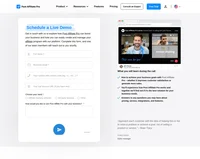What is Email Marketing?
Email marketing is the process of sending commercial messages to a group of people using email. It is a powerful tool used to promote products or services, build relationships with customers, and encourage customer loyalty. As a direct marketing channel, email marketing involves sending advertisements, requesting business, or soliciting sales and donations via email. It is a key component of digital marketing strategies due to its cost-effectiveness and high return on investment (ROI). Businesses often use email marketing to engage existing customers, acquire new customers, and increase brand awareness.
In 2024, the email marketing industry continues to evolve with a strong emphasis on privacy, personalization, and sustainability. With the global email marketing market projected to grow from $7.5 billion in 2020 to $17.9 billion by 2027, it remains a vital strategy for businesses aiming to maintain direct and effective communication with their audience.

Key Components of Email Marketing
- Email List: A curated database of subscribers who have opted to receive communications from a business. Building a targeted email list is crucial for effective email marketing. It’s important to regularly clean and update the list to ensure high engagement and reduce the energy and resources spent on uninterested subscribers.
- Email Campaigns: Structured emails sent to a list of subscribers with a specific purpose, such as promoting a new product, offering discounts, or sharing company news. Campaigns must be well-planned and executed to maximize impact and ensure that content remains relevant to the audience.
- Email Service Provider (ESP): A platform or software used to manage and send email marketing campaigns. Examples include Mailchimp, Constant Contact, and Brevo. These platforms offer tools for segmentation, automation, and analytics, making it easier for marketers to reach their goals.
- Segmentation: Dividing an email list into smaller groups based on specific criteria, such as demographics or purchase history, to send more targeted and relevant emails. Segmentation increases the effectiveness of email campaigns by ensuring that content is tailored to the interests and needs of different subscriber groups.
- Personalization: Customizing emails to make them more relevant to individual recipients by using their names or tailoring content based on their preferences and behaviors. Personalization is a key factor in improving engagement and conversion rates, as it makes the communication feel more direct and meaningful to the recipient.
- Automation: The use of technology to automatically send emails based on specific triggers, such as a customer’s behavior or a predetermined schedule. Automation streamlines marketing efforts, allowing businesses to maintain consistent communication with minimal manual intervention.
Types of Email Marketing Campaigns
- Promotional Emails: Emails aimed at driving sales by promoting products, services, or special offers. These emails are designed to create a sense of urgency and encourage immediate action from the recipient.
- Transactional Emails: Automated emails triggered by specific actions taken by customers, such as order confirmations or password reset requests. These emails are essential for providing a seamless customer experience and reinforcing trust in the brand.
- Newsletters: Regularly distributed emails that provide subscribers with updates, news, and valuable content from the business. Newsletters help keep the brand top-of-mind and foster a sense of community among subscribers.
- Welcome Emails: Initial emails sent to new subscribers to introduce the brand and set the tone for future communications. A well-crafted welcome email can significantly impact the subscriber’s perception of the brand and their likelihood to engage with future content.
- Re-engagement Emails: Emails designed to re-capture the interest of inactive subscribers or customers. These campaigns aim to revive the relationship with the recipient and encourage them to become active participants once again.
Benefits of Email Marketing
- High ROI: Email marketing is one of the most cost-effective marketing channels, with a high return on investment. It allows businesses to reach a large audience at a relatively low cost, making it an attractive option for companies of all sizes.
- Direct Access to Audience: Emails are delivered directly to subscribers’ inboxes, providing a personal and direct line of communication. This direct access helps build stronger relationships with the audience and increases the likelihood of engagement.
- Increased Brand Awareness: Regular email communication keeps a brand top of mind for subscribers. By consistently providing valuable content, businesses can reinforce their brand identity and foster loyalty among their audience.
- Scalability: Emails can be sent to large audiences without significant cost increases. This scalability makes email marketing an ideal tool for businesses looking to expand their reach and grow their customer base.
- Measurable Results: Email marketing allows for easy tracking of metrics such as open rates, click-through rates, and conversions. These measurable results enable marketers to continuously optimize their campaigns for better performance.
Challenges and Best Practices
- Avoiding Spam Filters: To prevent emails from being marked as spam, ensure compliance with regulations like CAN-SPAM and use double opt-in methods. It’s crucial to maintain a clean and engaged email list to improve deliverability rates.
- Design and Responsiveness: Emails should be well-designed and optimized for different devices to ensure a good user experience. A responsive design ensures that emails look great on any screen size, improving engagement rates.
- Maintaining Engagement: Regularly cleaning email lists and segmenting subscribers help maintain high engagement rates. Businesses should focus on delivering relevant content to keep subscribers interested and reduce the likelihood of unsubscribes.
- Tracking Performance: Use analytics to monitor campaign performance and adjust strategies accordingly. By analyzing key metrics, marketers can identify areas for improvement and make data-driven decisions to enhance their email marketing efforts.
- Integrating with Affiliate Marketing: Email marketing can be an effective tool for affiliate marketers to promote products and drive traffic to affiliate links, increasing commission earnings. By leveraging segmentation and personalization, affiliate marketers can create targeted campaigns that resonate with their audience.
Email Marketing and Affiliate Marketing
Email marketing is a valuable strategy for affiliate marketers. By building an email list and creating targeted campaigns, affiliate marketers can promote products or services to their audience, driving traffic to affiliate links and increasing potential earnings. Integrating email marketing with affiliate software can help automate and track the performance of affiliate promotions, ensuring that marketers can optimize their strategies for maximum effectiveness.ting cutting-edge technologies like AI will shape the future of email marketing.
Frequently Asked Questions
Why email marketing is important?
Email marketing is important because it allows businesses to reach a large number of people at a relatively low cost. It can also be highly customized, which means that businesses can send targeted messages to their customers.
How is email marketing done?
There are many ways to set up an email marketing strategy, such as building a list of subscribers, creating compelling content, and using effective email marketing tools.
How can I get email marketing lists?
There are a number of ways to get email marketing lists such as purchasing or renting them from a list provider or building your own email marketing list by collecting email addresses from your website, blog, or other online presence.
Discover Post Affiliate Pro's flexible pricing plans tailored to fit your business needs, with options for Pro, Ultimate, and Network packages. Enjoy a free trial with no credit card required, no setup fees, and the freedom to cancel anytime. Benefit from features like unlimited affiliates, advanced reporting, customizable interfaces, and lifetime support. Save up to 20% with annual billing and take advantage of more than 220 integrations. Perfect for businesses seeking to enhance their affiliate marketing efforts. Visit now to find the ideal plan for you!
The leader in Affiliate software
Post Affiliate Pro offers a comprehensive affiliate software platform to manage multiple affiliate programs with ease. Enjoy no setup fees, 24/7 customer support, and a free 1-month trial. Ideal for small and large businesses, it features precise tracking, automated workflows, and customizable tools to boost your affiliate marketing success. Try it now and streamline your affiliate operations effortlessly!
Explore Post Affiliate Pro's comprehensive Affiliate Program Directory, featuring diverse opportunities with competitive commissions and flexible payout options. Discover programs across various industries, accept worldwide traffic, and elevate your affiliate marketing game. Join today and maximize your earnings!
Effortlessly integrate your e-commerce site with Post Affiliate Pro and boost your affiliate program's success. Our expert team ensures seamless integration with your payment processor, handling technical issues along the way. Enjoy a free trial and free integration service, saving you time and maximizing your ROI. Join now and experience top-notch affiliate management with over 500 integration options.










